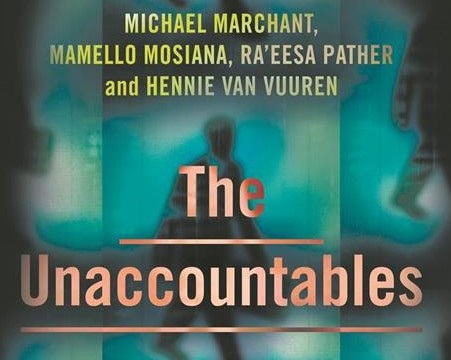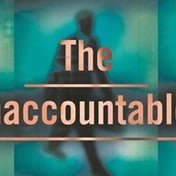
Criminal networks that were established during the apartheid era have remained entrenched and have continued plundering public resources throughout South Africa’s 28 years of democracy – with impunity.
A new book, The Unaccountables, chronicles economic crimes and corruption dating back 50 years and profiles 35 complicit corporations and private individuals, as well as politicians and state institutions. Its common thread is that none of the implicated individuals and corporations has been held accountable in either the apartheid or democratic eras.
Authors Michael Marchant, Mamello Mosiana, Ra’eesa Pather and Hennie van Vuuren – of Open Secrets – are calling for accountability.
READ: Book review | Scattered - The odyssey of Khulu Mbatha
“This book covers investigations that Open Secrets has done over the years and we’ve realised that there’s a central story of impunity in all [our] work,” says Marchant.
The Unaccountables delves into profiteers of apartheid, war, state capture and welfare, and puts banks, audit firms, management consulting companies and lawyers into the spotlight.
Marchant says two things stand out about the book: “We’ve covered a huge period, from 50 years ago all the way through to democracy. Secondly, the book shows that the networks which were involved in state capture during apartheid have survived until now.
“It was a deliberate choice by us to write a book on how economic crimes have worked and the cycle of impunity we’ve seen, [including] the Truth and Reconciliation Commission turning a blind eye to private companies and the National Prosecuting Authority [NPA].”
The erstwhile National Party, which was the architect of apartheid, is exposed as the instigator of state capture, which also saw its claws digging into the private sector.
These are examples of how the National Party rewarded its corporate benefactors:
. Barloworld, formerly known as Barlo Rand, sponsored the National Party during former president FW de Klerk’s tenure with a donation of R50 000 and asked to be kept anonymous. One of its directors, Derek Cooper, who retired from Standard Bank in 2010, was responsible for the donations.
READ: Books | The second category of political insurance
In return, the company was awarded technology contracts which government used for military purposes. The Barlo Rand leadership also served other entities, including De Klerk’s predecessor, PW Botha’s, defence advisory board.
. The Sanlam financial services group donated six payments amounting to R220 000 (the equivalent of R42 million today) to Botha’s party. Letters from its chairperson Fred du Plessis, dated 1983, revealed that Sanlam supported apartheid.
Du Plessis wrote: “The company will give him [Botha] moral support in carrying out the demanding tasks that rests on his shoulders.”
Botha responded:
Shoprite businessperson Christo Wiese is also implicated in the book for benefiting from apartheid’s spoils. In 1989, a letter was sent by then minister of trade, industry and tourism Kent Durr to De Klerk informing him of Wiese’s monetary support and allegiance to the National Party.
Post-apartheid crimes
In post-apartheid crimes, The Unaccountables profiles the procrastinated arms deal trial of former president Jacob Zuma and French company Thales.
The authors detail the constant delaying tactics employed by Zuma to derail the trial involving 18 charges of fraud, corruption, racketeering and money laundering related to the 783 payments made to him by his former associate, convicted fraudster Shabir Shaik.
The tide has now turned against the lead prosecutor, Advocate Billy Downer, for allegedly leaking medical records to News24 journalist Karyn Maughan before the matter was argued in court.
The authors concluded:
Open Secrets and Shadow World Investigations launched a complaint about the conduct of judges Willie Seriti and Hendrik Musi of the Seriti Commission, who cleared both Zuma and Shaik of all wrongdoing. Their report was later set aside in 2019 in the Pretoria High Court.
Failure to prosecute cases
The NPA is investigating director of public prosecutions in Johannesburg Andrew Chauke for failure to prosecute many high-profile cases, which have cast a dark shadow on his and the authority’s credibility.
The book reads:
reads the book.
Gauteng NPA spokesperson Phindi Mjonondwane confirmed to Open Secrets that investigations of a number of prosecutors, including Chauke, were under way.
“Recently, Chauke has caused chagrin in the NPA over his failure to prosecute former North West SAPS deputy commissioner Major General Jan Mabula, who stands accused of authorising and overseeing the kidnapping and torturing of detainees in police custody,” reads the book.
Support for investigative journalism
The Unaccountables, says Marchant, calls for accountability from apartheid to current state capturers, changes in the country’s law to make it easier to bring miscreants to justice and the protection of whistleblowers.
“We also call people who have money to support investigative journalism. Look at state capture: we’re indebted to journalists for exposing it,” he adds.
READ: Wole Soyinka releases first novel in 48 years
According to the book, the brunt of state capture was borne by people who needed state funding most.
“The real cost of state capture is evident in unemployment, inequality, rolling blackouts, trains that don’t arrive and grants that don’t get paid. Public spending on basic services has declined as government struggles to pay its debts, while fuel and food prices continue to rise,” says Marchant.




 Publications
Publications
 Partners
Partners









